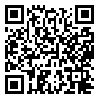BibTeX | RIS | EndNote | Medlars | ProCite | Reference Manager | RefWorks
Send citation to:
URL: http://jdc.tums.ac.ir/article-1-5279-en.html
2- Department of Public Health, School of Health, Hamedan University of Medical Sciences, Hamedan, Iran
3- Research Center for Behavioral Disorders and Substance Abuse, Department of Public Health, Hamedan University of Medical Sciences, Hamedan, Iran ,
Background and Aim: Cosmetic surgery is performed to change the appearance of people and improve their
self-esteem and according to the available reports, Iran ranked first in cosmetic surgery. The aim of this study was to determine the socio-cultural attitudes about cosmetic surgery and its related factors among female students of Hamadan University of Medical Sciences.
Methods: This cross-sectional study was carried out on 340 female students of Hamadan University of Medical Sciences in 2017 with a stratified sampling method. To gather data, we used socio-cultural attitudes questionnaire and recorded demographic variables. Data were analyzed with SPSS 24 software using t-test, ANOVA and linear regression tests.
Results: The age group of 21-30 years were the most frequent participants (56.7%). Most of the students were medical students (24.4%). They often received information about cosmetic surgery via the internet (63.2%). There were significant statistical relationships between social and cultural attitudes with the field of study and father's job (P<0.05). The results of regression analysis showed that the variables of the father's job and body mass index evaluation predicted the social and cultural attitudes.
Conclusion: It is recommended to conduct similar studies other universities of the country and compare them with the findings of this research.
Received: 2018/03/4 | Accepted: 2018/03/4 | Published: 2018/03/4
| Rights and permissions | |
 |
This work is licensed under a Creative Commons Attribution-NonCommercial 4.0 International License. |





